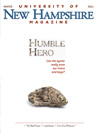 |
 |
| current issue |  | past issues |  | send a letter/news |  | address update |  | advertise |  | about us |  | alumni home |
Web Extras
Revisiting "Peyton Place"Page: < Prev 1 2 3 4
 |
I bet Friedan studied Metalious. While Metalious has been given credit for paving the way for chick-lit authors to come after her such as Jacqueline Susann, she has rarely been given credit for a real contribution to the Women's Movement. Yet, it was her book that broke the barrier for American women. She started the dialogue. Granted, it was a rough and raging dialogue at first, but that too was progress over no dialogue at all. The female characters in Peyton Place were given all kinds of agency. Relying on men was shown to be rather unreliable. There is no question but that this was an empowering book.
She has never been given credit for contributing to the reproductive freedom of American women, yet her book opened that dialogue too. Many readers, of all ages, said they knew little or nothing about abortion before reading the novel. In the age before the pill, knowledge was critical. Knowledge is always power. The landmark case of Roe v Wade came in 1973, years after Peyton Place, with many of the same points about age, incest and rape that Metalious had highlighted as part of the dialogue.
She has never received any recognition whatsoever for advancing the rights of children, yet here I contend that her accomplishment was nothing less than heroic. Before this book, child abuse was not considered a social problem, but a rare (and sometimes justifiable) aberration that was best overlooked. The subject of incest was simply not acknowledged at all. Even in the revolutionary Kinsey reports that preceded Peyton Place by eight years, it was barely mentioned, defined only as sex between siblings, and was listed as being extremely rare. Child abuse, like spousal abuse, was tolerated in all segments of society. Victims were expected to tolerate it, too. The New Hampshire girl who shot her father-rapist in 1947 was sentenced to 30 years in prison. Metalious changed all of that. Child advocacy in America started after Peyton Place, from simple material aid, to the training of doctors, nurses and social workers in intervention, to the recognition of incest as an all-too-common occurrence. Now even children are taught what their rights are. Credit for the start of that massive social reform is given to a man, Dr. C. Henry Kempe, who coined the phrase "battered child" in 1961 (five years after Peyton Place was published) regarding physical abuse. Later he would expand it to a syndrome that encompasses all forms of maltreatment including assault, malnutrition, medical neglect and sexual and emotional abuse. All of these were touched on in Peyton Place. All were sordid secrets that were ignored at every level of society before her book brought them out in the open. Once his work was accepted, Congress passed the Child Abuse Prevention and Treatment Act in 1974. It is impossible, even unimaginable, to know how many young lives were saved by this development. Very few writers have left such an enduring legacy.
In turning to the people who knew her best there is additional endorsement. The man she twice married and whom she knew her all of her life, George Metalious '51, told The Boston Globe writer Sarah Schweitzer in 2007 that "Grace failed to receive credit for the role Peyton Place played in loosening the social strictures of the 1950s. There's much more to the feminist movement now … She was instrumental in that."
And so much more. As a woman, a mother, a writer and a citizen I believe I owe Grace Metalious a debt of gratitude. No artist or activist deserves to be vilified as she was. Neighbors recall how she was called awful names, how rocks and rotten tomatoes were thrown at her house, how her husband lost his job, how she and her innocent children were completely shunned -- the ultimate social punishment, just for telling a story. It is obvious that the brutal backlash contributed to her drinking herself to death before her 40th birthday. That was a wrong that can't be undone, but her ex-husband, children and grandchildren still could and should see her get the recognition she deserves. It would bring a little grace to us all.Tammi Truax '85 began writing recently after 20 years working with children, specializing in family literacy. She lives in Portsmouth, N.H., and is a columnist for the Portsmouth Herald while working on a novel and children's books. She co-founded the Prickly Pear Poetry Project, a nonprofit writing workshop offered to oncology centers, churches and other community organizations, following the death of her husband, Ian Gordon '83. She is also co-producer of Seacoast Journal on WSCA 106.1 LP FM, and blogs at www.aintiawriter.blogspot.com This essay is an adaptation of a paper she wrote for a graduate class at Harvard Extension School on protest literature.
Page: < Prev 1 2 3 4Easy to print version
blog comments powered by Disqus

